- Home
- H. Beam Piper
Crossroads of Destiny Page 2
Crossroads of Destiny Read online
Page 2
here," hetold the plump man abruptly. "If you did, you wouldn't ruin it with suchtimid and unimaginative treatment."
I thought he'd been staying out of the conversation because it was overhis head. Instead, he had been taking the plump man's idea apart,examining all the pieces, and considering what was wrong with it and howit could be improved. The plump man looked startled, and thenangry--timid and unimaginative were the last things he'd expected hisidea to be called. Then he became uneasy. Maybe this fellow was atypical representative of his lord and master, the faceless abstractioncalled the Public.
"What do you mean?" he asked.
"Misplaced emphasis. You shouldn't emphasize the event that could havechanged history; you should emphasize the changes that could have beenmade. You're going to end this show you were talking about with a shotof Columbus wading up to the beach with an English flag, aren't you?"
"Well, that's the logical ending."
"That's the logical beginning," the sandy-haired man contradicted. "Andafter that, your guest historian comes on; how much time will he beallowed?"
"Well, maybe three or four minutes. We can't cut the dramatization tooshort--"
"And he'll have to explain, a couple of times, and in words of onesyllable, that what we have seen didn't really happen, because if hedoesn't, the next morning half the twelve-year-old kids in the countrywill be rushing wild-eyed into school to slip the teacher the realinside about the discovery of America. By the time he gets that done,he'll be able to mumble a couple of generalities about vast andincalculable effects, and then it'll be time to tell the public aboutWidgets, the really safe cigarettes, all filter and absolutely free fromtobacco."
The waiter arrived at this point, and the sandy-haired man orderedanother rye highball. I decided to have another bourbon on the rocks,and the TV impresario said, "Gin-and-tonic," absently, and went into areverie which lasted until the drinks arrived. Then he came awake again.
"I see what you mean," he said. "Most of the audience would wonder whatdifference it would have made where Columbus would have gotten hisships, as long as he got them and America got discovered. I can see itwould have made a hell of a big difference. But how could it be handledany other way? How could you figure out just what the difference wouldhave been?"
"Well, you need a man who'd know the historical background, and you'dneed a man with a powerful creative imagination, who is used to using itinside rigorously defined limits. Don't try to get them both in one; acollaboration would really be better. Then you work from the knownsituation in Europe and in America in 1492, and decide on the immediateeffects. And from that, you have to carry it along, step by step, downto the present. It would be a lot of hard and very exacting work, butthe result would be worth it." He took a sip from his glass and added:"Remember, you don't have to prove that the world today would be the wayyou set it up. All you have to do is make sure that nobody else would beable to prove that it wouldn't."
"Well, how could you present that?"
"As a play, with fictional characters and a plot; time, the present,under the changed conditions. The plot--the reason the coward conquershis fear and becomes a hero, the obstacle to the boy marrying the girl,the reason the innocent man is being persecuted--will have to grow outof this imaginary world you've constructed, and be impossible in ourreal world. As long as you stick to that, you're all right."
"Sure. I get that." The plump man was excited again; he was about halfsold on the idea. "But how will we get the audience to accept it? We'reasking them to start with an assumption they know isn't true."
"Maybe it is, in another time-dimension," the colonel suggested. "Youcan't prove it isn't. For that matter, you can't prove there aren'tother time-dimensions."
"Hah, that's it!" the sandy-haired man exclaimed. "World of alternateprobability. That takes care of that."
He drank about a third of his highball and sat gazing into the rest ofit, in an almost yogic trance. The plump man looked at the colonel inbafflement.
"Maybe this alternate-probability time-dimension stuff means somethingto you," he said. "Be damned if it does to me."
"Well, as far as we know, we live in a four-dimensional universe," thecolonel started.
The elderly man across from him groaned. "Fourth dimension! Good God,are we going to talk about that?"
"It isn't anything to be scared of. You carry an instrument formeasuring in the fourth dimension all the time. A watch."
"You mean it's just time? But that isn't--"
"We know of three dimensions of space," the colonel told him, gesturingto indicate them. "We can use them for coordinates to locate things, butwe also locate things in time. I wouldn't like to ride on a train or aplane if we didn't. Well, let's call the time we know, the time yourwatch registers, Time-A. Now, suppose the entire, infinite extent ofTime-A is only an instant in another dimension of time, which we'll callTime-B. The next instant of Time-B is also the entire extent of Time-A,and the next and the next. As in Time-A, different things are happeningat different instants. In one of these instants of Time-B, one of thethings that's happening is that King Henry the Seventh of England isfurnishing ships to Christopher Columbus."
The man with the odd clothes was getting excited again.
"Zees--'ow you say--zees alternate probabeelitay; eet ees a theoryzhenerally accept' een zees countree?"
"Got it!" the sandy-haired man said, before anybody could answer. He sethis drink on the stand-tray and took a big jackknife out of his pocket,holding it unopened in his hand. "How's this sound?" he asked, and hitthe edge of the tray with the back of the knife, _Bong_!
"Crossroads--of--_Destiny_!" he intoned, and hit the edge of the trayagain, _Bong_! "This is the year 1959--but not the 1959 of our world,for we are in a world of alternate probability, in another dimension oftime; a world parallel to and coexistent with but separate from our own,in which history has been completely altered by a single momentousevent." He shifted back to his normal voice.
"Not bad; only twenty-five seconds," the plump man said, looking up fromhis wrist watch. "And a trained announcer could maybe shave five secondsoff that. Yes, something like that, and at the end we'll have anotherthirty seconds, and we can do without the guest."
"But zees alternate probibeelitay, in anozzer dimension," the strangerwas insisting. "Ees zees a concept original weet you?" he asked thecolonel.
"Oh, no; that idea's been around for a long time."
"I never heard of it before now," the elderly man said, as though thatcompletely demolished it.
"Zen eet ees zhenerally accept' by zee scienteest'?"
"Umm, no," the sandy-haired man relieved the colonel. "There'sabsolutely no evidence to support it, and scientists don't acceptunsupported assumptions unless they need them to explain something, andthey don't need this assumption for anything. Well, it would come inhandy to make some of these reports of freak phenomena, like mysteriousappearances and disappearances, or flying-object sightings, or reportedfalls of non-meteoric matter, theoretically respectable. Reports likethat usually get the ignore-and-forget treatment, now."
"Zen you believe zat zeese ozzer world of zee alternate probabeelitay,zey exist?"
"No. I don't disbelieve it, either. I've no reason to, one way oranother." He studied his drink for a moment, and lowered the level inthe glass slightly. "I've said that once in a while things get reportedthat look as though such other worlds, in another time-dimension, mayexist. There have been whole books published by people who collectstories like that. I must say that academic science isn't veryhospitable to them."
"You mean, zings sometimes, 'ow-you-say, leak in from one of zees ozzerworlds? Zat has been known to 'appen?"
"Things have been said to have happened that might, if true, be cases ofthings leaking through from another time world," the sandy-haired mancorrected. "Or leaking away to another time world." He mentioned a fewof the more famous cases of unexplained mysteries--the English diplomatin Prussia who vanished in plain sight of a number of people, th
e shipfound completely deserted by her crew, the lifeboats all in place;stories like that. "And there's this rash of alleged sightings ofunidentified flying objects. I'd sooner believe that they came fromanother dimension than from another planet. But, as far as I know,nobody's seriously advanced this other-time-dimension theory to explainthem."
"I think the idea's familiar enough, though, that we can use

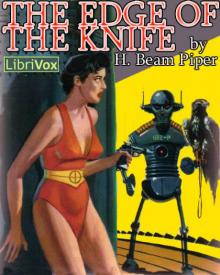 The Edge of the Knife
The Edge of the Knife Genesis
Genesis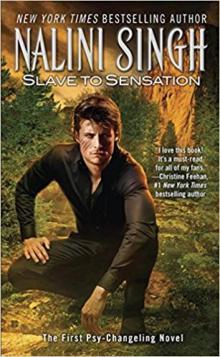 A Slave is a Slave
A Slave is a Slave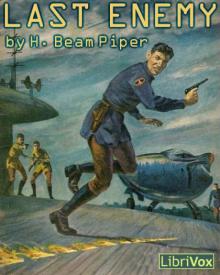 Last Enemy
Last Enemy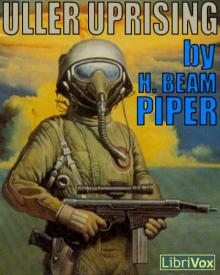 Uller Uprising
Uller Uprising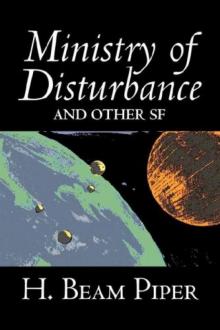 Ministry of Disturbance
Ministry of Disturbance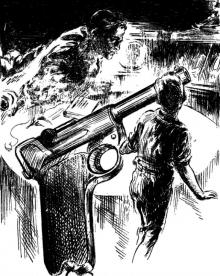 Time and Time Again
Time and Time Again The Mercenaries
The Mercenaries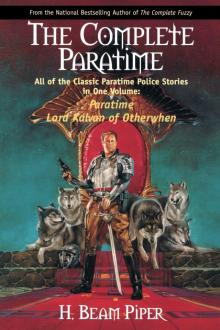 Police Operation
Police Operation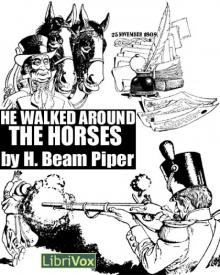 He Walked Around the Horses
He Walked Around the Horses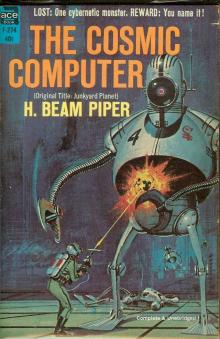 Time Crime
Time Crime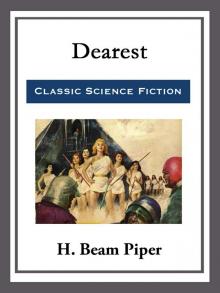 Dearest
Dearest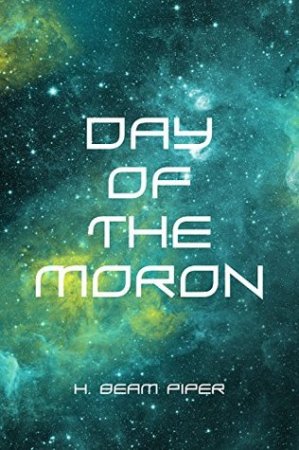 Day of the Moron
Day of the Moron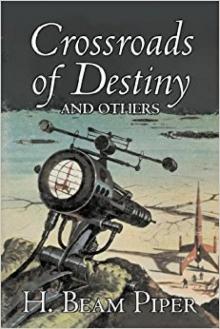 Crossroads of Destiny
Crossroads of Destiny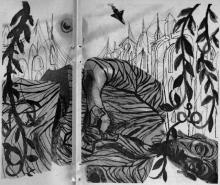 Graveyard of Dreams
Graveyard of Dreams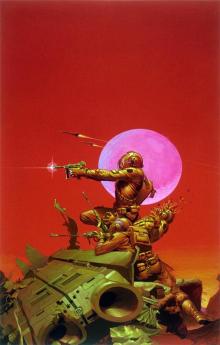 The Cosmic Computer
The Cosmic Computer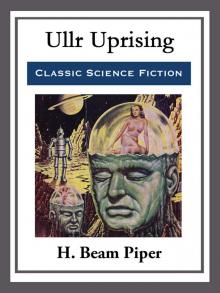 Ullr Uprising
Ullr Uprising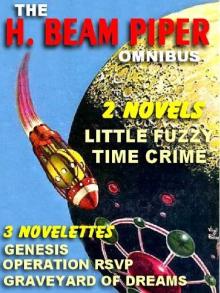 Operation R.S.V.P.
Operation R.S.V.P.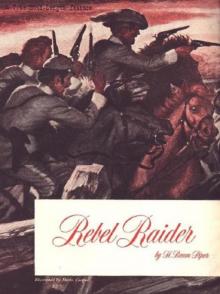 Rebel Raider
Rebel Raider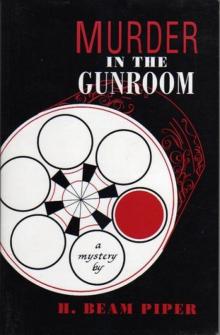 Murder in the Gunroom
Murder in the Gunroom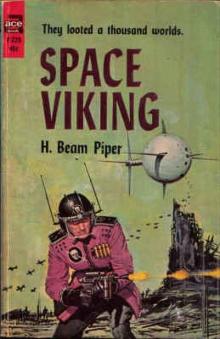 Space Viking
Space Viking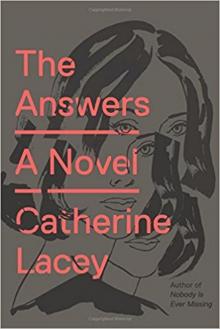 The Answer
The Answer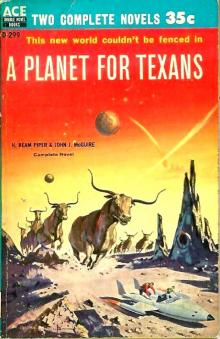 A Planet for Texans (aka Lone Star Planet)
A Planet for Texans (aka Lone Star Planet)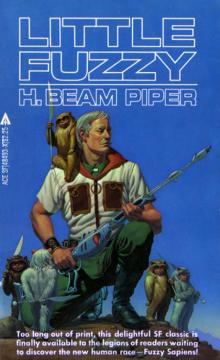 Little Fuzzy
Little Fuzzy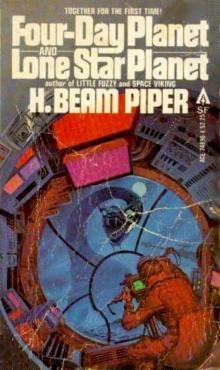 Four-Day Planet
Four-Day Planet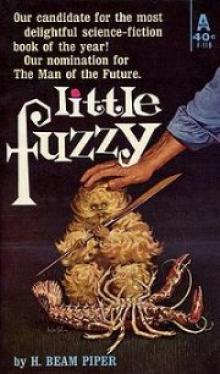 Little Fuzzy f-1
Little Fuzzy f-1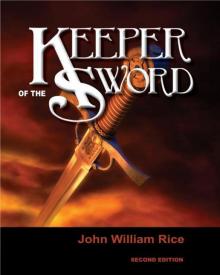 Keeper
Keeper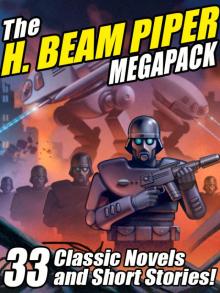 The H. Beam Piper Megapack
The H. Beam Piper Megapack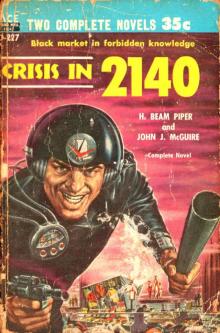 H. Beam Piper
H. Beam Piper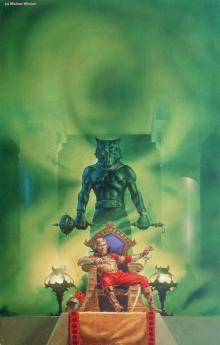 Lord Kalvan of Otherwhen
Lord Kalvan of Otherwhen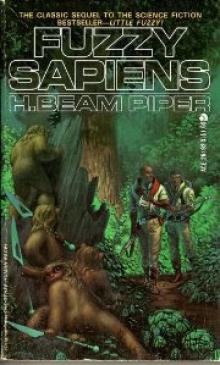 Fuzzy Sapiens f-2
Fuzzy Sapiens f-2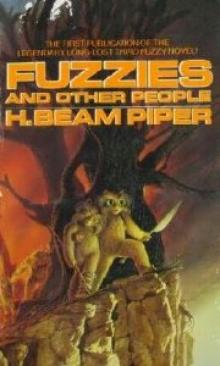 Fuzzies and Other People f-3
Fuzzies and Other People f-3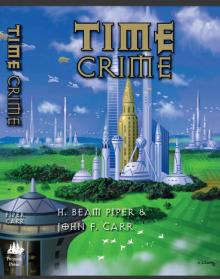 TIME PRIME
TIME PRIME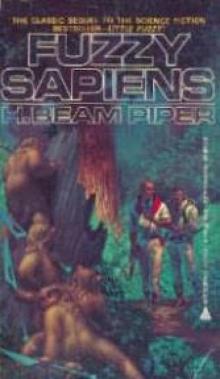 Fuzzy Sapiens
Fuzzy Sapiens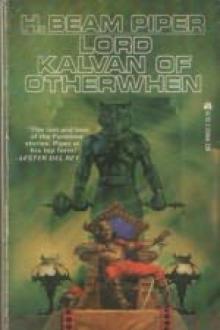 Lord Kalvan of Otherwhen k-1
Lord Kalvan of Otherwhen k-1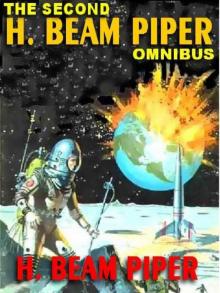 The Second H. Beam Piper Omnibus
The Second H. Beam Piper Omnibus